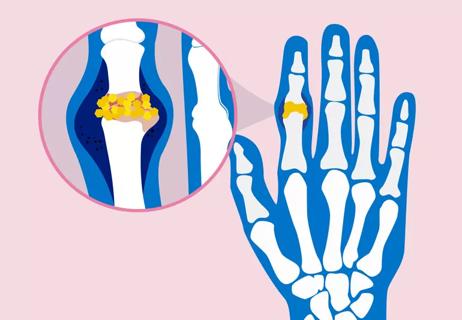What you should and shouldn't eat to avoid flare-ups

Diet myths about gout run deep. It was once known as the “disease of kings” because people associated it with the rich diets of the wealthy — but if you’ve had gout, you know the experience isn’t so regal.
Advertisement
Cleveland Clinic is a non-profit academic medical center. Advertising on our site helps support our mission. We do not endorse non-Cleveland Clinic products or services. Policy
The truth is much more complicated, however. Up to 4% of American adults have gout each year, and rising rates of obesity increase our risk. But don’t believe everything you hear when it comes to diet advice and gout. Diet matters — but not always in the way you think. Rheumatologist Scott Burg, DO, shares more insight into this common affliction.
No. “Patients often ask me about desserts, as well as entrees with rich sauces,” says Dr. Burg. It’s a common myth that these foods cause gout. When eaten in moderation, desserts and other rich foods do not affect gout flare-ups. But “moderation” is the key word. Rich foods might not cause flare-ups directly, but they can cause weight gain. And obesity is a major risk factor for gout attacks.
“At some point, the misconception spread that people with gout should avoid dairy. But in fact, certain dairy products — especially milk — can help you remove uric acid from your body,” Dr. Burg adds.
Yes, absolutely. High-fructose corn syrup is a known factor for gout flare-ups because it raises uric acid levels in your body. It’s also used in far more pre-packaged and processed foods than you might think. When you’re grocery shopping, always check nutrition labels. If corn syrup is an ingredient in a product, don’t buy it.
Advertisement
No. Acidic foods such as tomatoes, citrus and other fruits, beans and dairy products do not necessarily lead to higher uric acid levels. People often assume they do simply because of the word “acid,” but acidic foods and uric acid are not one and the same.
“No, but practice moderation,” Dr. Burg reiterates. Avoid organ meats such as liver, though, because they have higher levels of purines, which can cause flare-ups. Moderate intake of lean meats such as chicken and turkey should not affect your condition. Seafood such as shrimp and lobster tends to be higher in purines, as well, so don’t make them a regular part of your diet.
Yes. At some point, the misconception spread that people with gout should avoid dairy. But in fact, certain dairy products — especially milk — can help you remove uric acid from your body. In other words, dairy tends to help rather than hurt people with gout.
Yes, it’s a good idea to cut out alcohol. Alcohol molecules in your body tend to increase uric acid levels, so drinking can push you over the edge and into a flare-up. If you’re newly diagnosed and start taking medication, try cutting out alcohol at first. Your doctor may allow you to add a small amount back into your diet over time as your uric acid levels come down. “But even then, it’s best to avoid beer and liquor and stick to safer choices such as red wine,” Dr. Burg says.
All myths aside, the best advice for people with gout is to eat fresh, unprocessed foods. Choose complex carbohydrates (from fruits, for example) over refined carbs from packaged or processed foods. And always drink plenty of water because dehydration is a risk factor for an acute attack.
Advertisement
Learn more about our editorial process.
Advertisement

Learn how this gout treatment can improve your quality of life

The short answer from a rheumatologist

The flexible eating plan aims to boost your brain health by focusing on plant-based foods and limiting saturated fat

Eat this fatty fish two times a week to support your muscle, brain and heart health

Designed to lower your blood pressure, this eating plan focuses on heart-healthy foods like whole grains, fruits and vegetables

Eating well can help reduce inflammation when you have endometriosis

Focus on eating more whole grains, lean proteins, fruits and vegetables, and fewer processed foods and saturated fats

Risks of this restrictive eating plan include digestive issues, heart disease and cancer

If you’re feeling short of breath, sleep can be tough — propping yourself up or sleeping on your side may help

If you fear the unknown or find yourself needing reassurance often, you may identify with this attachment style

If you’re looking to boost your gut health, it’s better to get fiber from whole foods